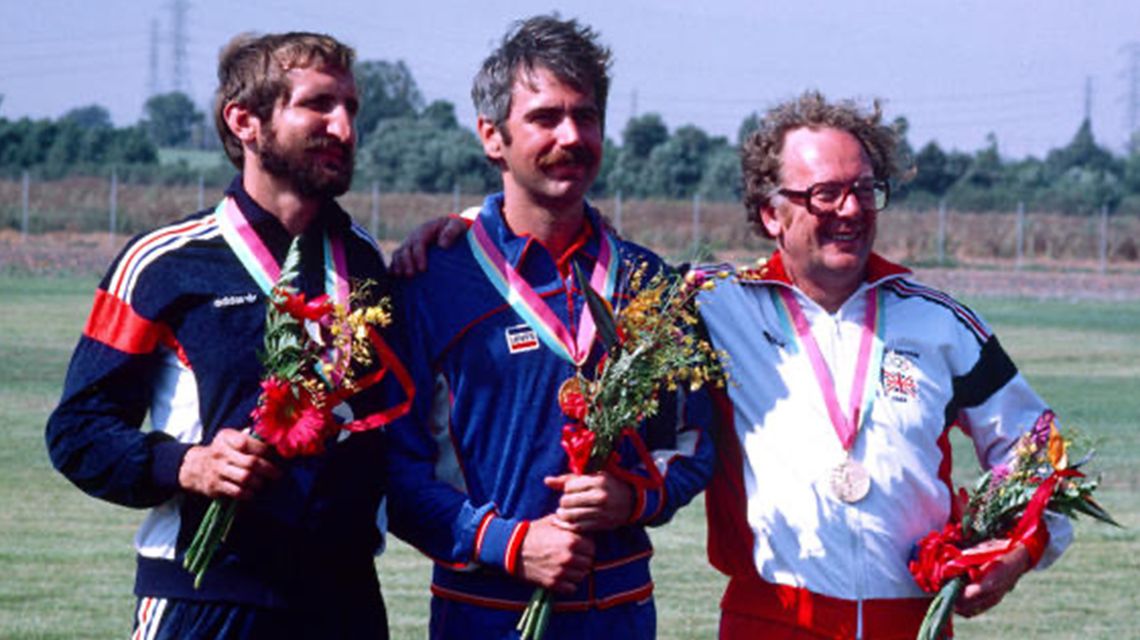
How former WVU rifle coach Ed Etzel went from gold medalist to helping college athletes with their mental health
MORGANTOWN, W.Va. (BVM) — Ed Etzel learned over the years that as a door of opportunity opens, one must walk through it. In many ways, that mindset helped Etzel get to where he is today. As opportunity after opportunity was presented, Etzel didn’t just walk through them, he ran through them.
When he was young, Etzel’s dad would take him and his brother out to the woods to learn how to shoot a .22 rifle. This was Etzel’s earliest experiences with a gun, a relationship that would only grow throughout the Connecticut native’s early years. After working through a little bit of the Boy Scouts of America, which Etzel admitted he wasn’t too passionate about, his parents signed him and his brother up for the Winchester Rifle Club in New Haven instead. The Etzel boys would participate in competitions, but it wasn’t anything the brothers took too seriously, according to Etzel, at least not until Etzel started showing some promise.
At the age of 12, Etzel entered a state shooting championship for junior kids. By the time the dust settled, he was the victor. Etzel credits this as the first “hook” of his passion for shooting.
“I thought well that’s pretty cool I guess I’m good at something so I guess that was somewhat of a hook,” Etzel said. “I liked the people there. They took me under their wings and coached me and I competed through my teen years.”
His excellence on the range opened collegiate opportunities for Etzel where he went to school at St. John’s University before returning home and transferring to Tennessee Tech University where he won three All-America honors, served as a two-time team captain and won two National Collegiate Rifle Team Championships. Following his time at the university, Etzel joined the U.S. Army and became a member of the U.S. Army Marksmanship Unit in Fort Benning, Ga.

During this time, he continued his participation in rifle competitions. The unit was invited to participate in a number of shooting events, including the 1975 World Military Rifle Championships in Finland where the 22-year-old Etzel again ended up on top, helping the team win the event. They were also invited to participate in a number of Team USA shooting tryouts for different types of events, including the Olympics.
Unfortunately for Etzel, he wouldn’t compete in the biggest world competition during the ‘70s. Instead, being faced with a different door, Etzel again went down a new path.
In 1976, Etzel learned through a friend that the rifle coach at West Virginia University was leaving the team and was selected as the team’s new coach. The team at the time had a long history, but not a very successful one, according to Etzel. This became clear in Etzel’s early years with his team practicing at the WVU rifle range in the old Mountaineer Field.
“The facilities were somewhere between horrible and miserable. We would shoot rats in there sometimes,” Etzel said with a laugh. “It was cold, there’s hardly any heating, it’s terrible. Just nasty.”
Equipped with little aid and resources, Etzel and his team defied the odds to become one of the most dominant programs over his 12 years at the helm.
From his first season in 1977 to his final season in 1989, the Mountaineers rifle team went 101-5 and won four national championships. During his time as head coach, Etzel coached six individual NCAA champions, 80 first-team All-Americans and had seven undefeated seasons. Etzel’s teams never finished worse than second place at the NCAA championships.
Etzel led the Mountaineers to the university’s first national championship in 1983, which included Dave Johnson winning the NCAA smallbore title, the Mountaineers’ first NCAA win in the discipline. The next season, the Mountaineers went undefeated and won their second straight national title while Bob Broughton helped secure the Mountaineers second straight NCAA smallbore title.
As a coach, Etzel was more of a keen observer than a tactician or disciplinarian. He would observe, ask questions, provide some feedback and most importantly be present for his team. Although he did not jump in too much with how his team operated on the range, Etzel had his hands on every aspect of the program.
“For a good part of the time it was a one-man show. I was it,” Etzel said. “I drove the van every mile and paid all the bills and did all the recruiting, all that kind of stuff.”
1984 was not only a success for Ed Etzel the coach, but also for Ed Etzel the competitor.
After not qualifying for the Olympic games from 1975-83, Etzel finally broke through and was selected to represent Team USA in the 1984 Olympic Games in Los Angeles.
“Anyone who has the privilege of representing her or his country has accomplished something,” Etzel said. “It meant a lot to me, but at the time I was really trying not to focus on that. You can’t help but be impressed when you’re in the Olympic opening ceremonies and see the people who are there, the really great American athletes and other athletes.”
The favorite to win the 50-meter prone shooting competition, Etzel went into the event following his mantra of “be mindful.”
“You’re taught as a kid to take one shot as a time and if you do that and you’re able to kind of keep it together, you can probably do pretty well,” Etzel said.
The favorite ended up being able to keep it together, scoring 599 points out of a possible 600 and winning the gold medal. The score also matched the Olympic record at the time. The aftermath of winning a gold medal was “pretty strange” for Etzel.
“There were a lot of distractions from that,” Etzel said. “I won the medal first and then within 12 hours I was on Good Morning America in Hollywood at 1 o’clock in the morning. … It became kind of strange right after that. Kind of an ironic thing about it, winning a medal can make things pretty strange and that continued for quite a while.”
For Etzel, he doesn’t put a lot of stock behind the win. Though he understands the significance around the event for some, he doesn’t view the medal in the same light.
“It sounds goofy, but it was something I did one morning,” Etzel said. “People want to make a lot out of it, but there are people who do stuff every day (that) save people’s lives, military and medical heroes. It is a big deal, but probably not as big of a deal as some people would make it.”
Etzel was honored by West Virginia along with fellow West Virginia resident and Olympic gymnast Mary Lou Retton, whom Etzel called “the darling of the Olympics, probably,” for their success. Etzel found the significance of the events for the state in that moment.
“In the state of West Virginia it was somewhat of a big thing,” he said. “Two of us won medals here, Mary Lou Retton and myself. So the state really kind of rose up and recognized those Olympic efforts in this place and this state, which is a great place.”
Etzel did give some credit to his Olympic success to some of his coaching success. Although he couldn’t say the win definitively aided the team, he said it may have helped recruits join the program in the later years and may have continued to help the program become one of the top in the entire country over the past 30 years.
“I guess it was helpful. It didn’t hurt,” Etzel said.
During his coaching tenure at West Virginia, Etzel was also a pillar in the academic community, teaching the basics of rifle class for over 12 years, with no injuries, according to Etzel, and continuing his own academic career. Etzel earned his master’s degree from the university in sport and exercise psychology and then earned his doctorate degree in counseling psychology in 1989. This helped Etzel to expand his understanding of the whole person. This strive to understand the individual would become his newest passion.

Etzel was hired by West Virginia University’s athletics department to be a clinical psychologist for its teams, a unique move for the time. Through his work, Etzel sensed a need for psychological and mental health support in college athletes.
“I don’t know of many people who were hired in that capacity (at the time). … Now every day you can look online and a university is hiring a consultant or a mental health provider,” Etzel said.
In 1991, Etzel along with two other colleagues edited a book titled “Counseling Student Athletes: Issues and Interventions”. The book gathered pieces discussing different aspects of the whole person and the mental health for collegiate student-athletes. This wasn’t the only piece that Etzel would help to create, as he has written a number of scholarly articles on the topic of sports psychology for many academic journals.
Now as the industry has begun to see growth with more collegiate and professional athletes opening up about their own struggles, Etzel looks back at the doors his earlier work has helped to open.
“It took awhile for the whole ball to get rolling, at least 10 years for people to wake up to this, that athletes are people first,” Etzel said. “There are many more people who are doing (sports psychology) and that’s a good thing to know to think we had some impact on that. … It still happens and it’s expanding.”
In 2013, Etzel was elected into the West Virginia University Sports Hall of Fame for his achievements in coaching. In 2017, he was placed in the U.S. International Shooting Hall of Fame for his achievements on the range. Etzel retired from counseling for the athletic department in 2016 and from academics in early 2018 after 43 years with the university. As a coach, athlete and scholar, Etzel has a laundry list of accomplishments, but the thing he is most proud of is how he helped students through their struggles with their mental health.
“To help a lot of college students make it through and negotiate their college experience,” Etzel said of the accomplishment he is most proud of. “Helping people negotiate college and become a different person and accomplish whatever they had in the classroom or on the field.”
The 67-year-old now spends his time growing radishes and garlic in his garden, staying in shape, playing guitar or being the retro rock and blues DJ on WWVU-FM radio station. Although he’s seen the field he once put so much care and effort to help cultivate flourish over the past few years, he’s satisfied in where he is at.
“I’m not that guy anymore. That’s not my cross to bear. I’ll watch the garlic grow and tune the guitars,” Etzel said with a laugh.






